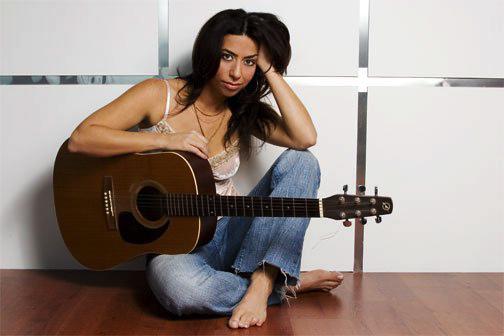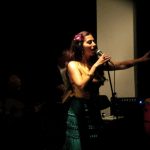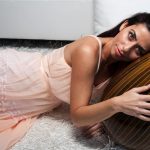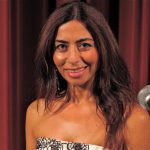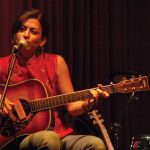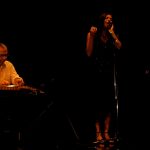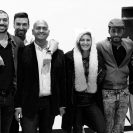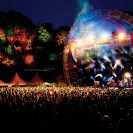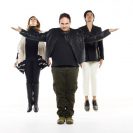Music is that magical air that lives in our space. It knows no boundaries, carries no stigmas. It is unconditional love expressed through one’s energy. And like energy, music can neither be created nor destroyed – it is simply transformed, from one soul to the other.
May we all be the conduits of its magic.
~ Elizabeth Ayoub
A promising light among young American and Arab artists. She sings in various languages with conviction and full emotion. Her heartfelt songs are of folk quality and rhythm, with a jazz-blues bend (she is often compared to Norah Jones and Fairuz). She has a beguiling voice and captivating talent. With each song, she creates a rich tapestry of images, a journey for the listener to relish. She believes that music, like acting (as she is also a trained actress) must move the audience. A storyteller at heart, her lyrics give way to her personal history.
She was born in Caracas, Venezuela. Her parents emigrated from Lebanon to Venezuela before the civil war in search of a promising future. The youngest of seven siblings, she always knew she would become a singer. She was thrust into an environment where three different languages were freely spoken and where her musical influences ranged from Koranic verse and Fairuz, to Simon & Garfunkel and Barbra Streisand. She performed at a young age in various school musicals at the American Prep School in Caracas. There, she studied choral music and performed with the school choir for a number of years. When she was 16, she performed at a Latin Rock music festival in Caracas with her school band. The band was so well received, that a talent scout approached them for a recording contract. However, the stars weren’t aligned for her and the band at that time and the deal fell through.
She then traveled to America to fulfill her family’s commitment in obtaining a university degree in marketing. But the stage was always in her heart. At the University of Miami, she studied Jazz voice and fell in love with Ella Fitzgerald. Soon, she began writing songs and playing them at folk festivals, open-mics and music industry showcases, one of which was for SONY execs.
After shopping a self-produced demo unsuccessfully, she dropped out of the music scene temporarily and fell in love with acting. She joined a theatre group and pursued acting for a few years. She took acting seriously and headed to NYC, where she trained intensively at the Atlantic Theatre Company, co-founded by Hollywood writer/director David Mamet and actor William H. Macy. It was in theatre where she was reacquainted with the power of her voice to move an audience. During this time, she met a fellow world-music enthusiast, Jose Elias. A Cuban-American of Lebanese decent, Jose and Elizabeth quickly formed a music alliance.
The achievement of their efforts led to a magnificent debut album, Prelude, where many different music styles (folk, jazz, latin) meld into one. Moreover, it reflects all her talents and gives the listener the unique opportunity to travel through her songs to different spaces. After the success of her first album, her music was discovered on Myspace and signed with a renowned Dutch-American world-music label, Times Square Records and went on to produce her sophmore album, Oceanos y Lunas, with the talented and sought-after Spanish producer Javier Limon (Paco de Lucia, Estrella Morente, Buika). The recording features musicians from Spain and Beirut and was received well among world music critics, including a soaring review on iTunes.
An activist for justice and peace, she carries the torch of tolerance and freedom wherever she performs.
How did your musical journey begin?
The minute I realized I loved singing and people asked for more. There was a connection between the listener and myself. I love that – making connections.
What/Who inspires you to compose your music?
Always difficult to answer. I draw inspiration from great film composers because I love film – I’d like my road to lead me there, composing for film. I love folk music and instruments – the Venezuelan cuatro, any primitive instrument with a string and someone singing along, the oud, the guitar, the timbre of the piano and the qanoun. The human voice; it carries experience and soul. Anything and everything should inspire. It’s part of being a creative person – you need to keep the channels open to everything.
Is the final sound of a musical track an individual or group effort?
In the end, whoever the creator is, it’s their final decision. If it’s a collaborative effort, which I love and aspire for more of, all need to be on board with the sound.
Who/What in your early beginnings influenced your music?
I grew up in Venezuela and went to an American school. So you can imagine the range: Lebanese music, with salsa and merengue in the air, and American pop. The singers and songwriters had a huge influence on me – Simon & Garfunkel, Cat Stevens, The Beatles, Barbra Streisand (yes, even Babs). Then Fairouz and Oum Kalthoum at home while the other Fairouz, my mom, was busy making kibbe, tabboule, black beans and sweet plantains for the family. Throw in some salsa and joropo, traditional folk music from the Venezuelan plains, that the house-help Maria would dance to while cleaning our home in Caracas, and you have quite a concoction. I’m so happy I grew up with all that. I wouldn’t change it for anything in this world.
In your opinion, what was the hardest challenge you faced in your musical career so far?
Touring and working with a record label; the loss of control in my work. I realized touring is not for everyone, especially for me because I come from a well-grounded background. There aren’t too many female artists of Arab heritage doing this, you know? It’s sort of a taboo, not really welcome by our families, especially Muslim like myself, though I’m mostly secular. It was a struggle within my own, even within myself. While I love giving concerts, being on the road takes its toll if you crave a balanced life. I think whomever you end up with as a partner, should embrace you for who you are. That said, I look forward to concerts and performances.
Was your acting career spurred on by the challenges you faced with your first self-produced demo?
Yes, probably. Acting came as a savior. It was a Cuban theatre actress that introduced me to this craft and I got hooked. Went to NYC to train with the best. I was able to loosen-up and use my instincts. Ultimately, it liberated me and gave me the courage to find my own voice, which led to my self-released album. I thank acting for my courage in music and in life. Everyone should take acting classes.
If you had to choose between acting and singing, which would you choose and why?
I love them both dearly but if I had to choose, I it would be music. I have more control as an artist. Nobody telling you “you don’t look the part,” or “we need someone with less this and more that.” I don’t fit any mold. I make my own path as an artist, whether it’s music, writing or acting.
How has the Middle East influenced your sound?
God, so much! It’s the soul of my music and voice. I wish I could do more of it and be better at it. The quarter tones, the richness in the space between the white and black keys of the piano – that’s where there’s magic in music. In the spaces between the keys. You’ll find me there any day!
Has the Arab Spring moved your music in any way?
I actually want to compose something for my next album, would love for it to be a collaborative effort. It’s just that there’s so much, you know? Anthony Shadid, an amazing journalist whose work I’ve admired and followed for years, died covering it the other day. Such a terrible loss. So much to tell, so much to say. Mohamad Bouazizi, the spark that lit the fire: that man’s story inspires me. The youth of Egypt and how they’re fighting for their right to choose their destiny. It’s overwhelming. It’s like a giant is waking up from a long slumber. There are so many forces at play – good and evil. It almost needs to be a soundtrack. A song cheapens it.
Do you find similarities between Lebanon and Venezuela? And how has your multi-cultural upbringing influenced your identity and music?
Absolutely. Latins and Arabs should be first-cousins! We’re fiery, passionate, we love family, are in love with life and can’t imagine life without some spice. I love Latin music – the beats, the percussion, the plaintive melodies. There’s so much we share in common.
Do you feel that music should always serve a specific purpose?
Music’s sole purpose is to inspire passion and infuse you with life. Put an instrument in the hands of a poor child, without any pre-requisite, give him/her great training, and a miracle happens. That has been happening in Venezuela for over thirty years in classical music; it’s called El Sistema. Imagine that in the Arab world? Powerful stuff.
What are some of your favorite tracks, and why?
“YaOud.” I wish I could write more songs like that. I knew when I sang it and my recording engineers were moved to tears listening to it, that it was going to be special.
Can you pinpoint the one moment where you knew, ‘this is where I’m meant to be’?
Whenever I’m on stage and sing my heart out, or when I’m creating, be it music or film. I’ve completed a short film about a puppet ballerina. I brought her to life and am dying to introduce her to the world. She’s quite amazing!
Where was your very first live performance? And what was the experience like?
In high school, naturally. Musicals were fun, so when I got to sing the part of a mom in the Runaway Snowman, I nailed the opportunity.
What is your dream performance space and destination?
Easy. The ruins of Baalbak. It’s magical. Someday it’s going to happen.
What would you like to accomplish in the future?
Score for films and collaborate with great artists.
Will there be any Elizabeth Ayoub performances in the Middle East in the near future?
Oh, God, yes. I can’t wait! I’m open to sponsorships.

